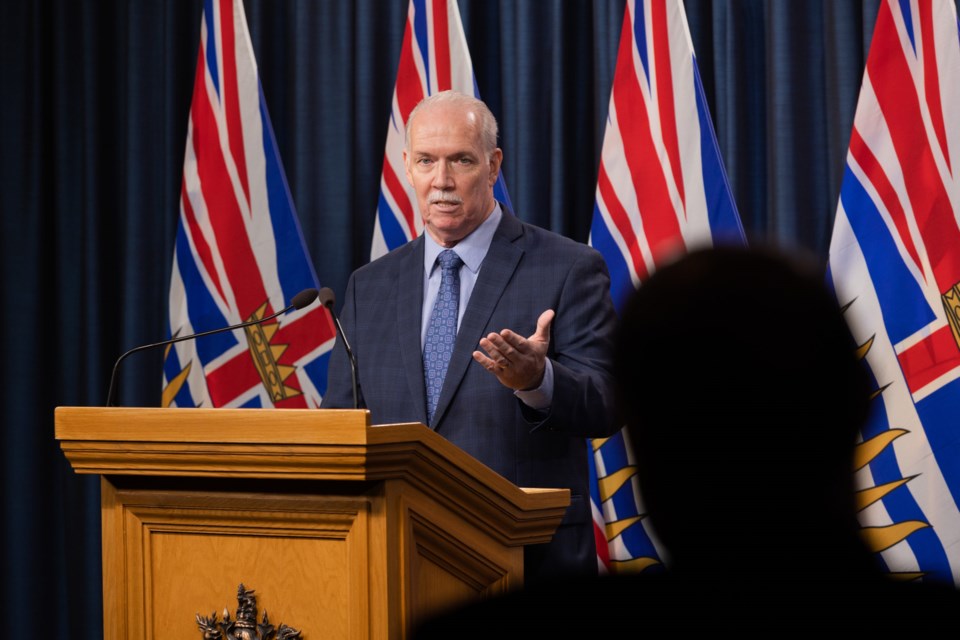BC’s New Democrat government tried to skate through its return to the legislature this week with a throne speech big on aspirational dreams of moving to a post-pandemic future, but short on actions to actually get there.
It didn’t work.
Premier John Horgan quickly found himself outmanoeuvred by other provinces whose premiers have taken control of the decision to phase out public health restrictions and return to normal.
His Tuesday throne speech was bookended by such announcements – just a few hours prior by Saskatchewan announcing an end to mandatory vaccinations in six days, and just a few hours after, with Alberta announcing the same changes effective at midnight. Both provinces pledged to stop scrap indoor mask rules by the end of the month.
Horgan, meanwhile, had nothing to say – both because this throne speech was 25 pages of vapid nothingness, but also because he continues to insist that it is Provincial Health Officer Dr. Bonnie Henry’s job to chart a path out of health restrictions, and not his as premier.
“I talked to our premiers and I know the grief that that brings with it,” he said, when asked why it is the leaders of provincial governments in other provinces making these decisions and not solely the discretion of medical officials.
“I don't want to leave the impression that I'm passing the buck to Dr Henry, but she is far more equipped and able to understand the data and translate that for the public than I am.”
For much of the pandemic, this has been an admirable position. While other premiers, like Alberta’s Jason Kenney and Ontario’s Doug Ford, have overrode and clashed with their top doctors to score cheap political points, Horgan has cleared the stage for Dr. Henry and Health Minister Adrian Dix to make most of the decisions based on the health evidence in front of them.
“I have very capable people around me that have more than enough experience and ability to do their work without me meddling in it,” Horgan said Tuesday. “It's just the approach that I've had from the beginning, and I don't see any reason to change that now. I have confidence in the people that are making these decisions.”
But the decision on how to re-open the province from health restrictions is no longer one based on science alone. Increasingly, with high vaccination rates amongst Canadians, it’s recognized that governments will have to act on a balance of risks – weighed on one side by the risk of pressure on the healthcare system, and on the other side by the risk of continued social, emotional, and economic harm that two years of lockdown measures has caused on an increasingly angry and frustrated public.
Saskatchewan Premier Scott Moe called it a “blend” of science and public opinion.
“Proof of vaccination has been an effective policy, but its effectiveness has run its course,” said Moe, whose government will also end daily reporting of COVID-19 cases next week.
“The benefits no longer outweigh the costs. It’s time to heal the divisions over vaccination in our families, in our communities and in our province. It’s time for proof of vaccination requirements to end.”
Alberta’s Kenney argued restrictions and mandates “must not become a permanent fixture in our lives” while noting there’s already widespread non-compliance with the rules by an exasperated public.
“I know that some will say this is too much change and that we are moving too fast,” he said. “But please keep in mind that we have the benefit of being a few weeks behind other jurisdictions such as the United Kingdom.”
The UK dropped most public health restrictions and masks at the end of January.
There are certainly political factors at play.
In Saskatchewan, Moe is supporting the trucker convoy. In Alberta, Kenney is dealing with a standoff involving truckers blockading the US border. In the UK, Prime Minister Boris Johnson is fighting for his political life after revelations of parties at 10 Downing Street that violated public health rules.
BC has no such political pressures. And so, it’s moving very cautiously by comparison. Henry has said the province will review some health restrictions before Family Day, Feb. 21, and more by spring break in mid-March.
Ontario and Quebec are next in line, signalling they may move sooner to re-open from the pandemic. Every province in which a premier takes control of the risk equation and chooses to act, puts more pressure on BC to eventually do the same.
Rob Shaw has spent more than 13 years covering BC politics, now reporting for CHEK News and writing for The Orca. He is the co-author of the national best-selling book A Matter of Confidence, and a regular guest on CBC Radio.



